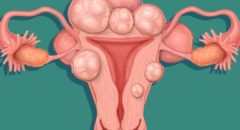
There have been so many facts and myths about birth control and what it does to the body since the beginning of time. With so many new variations of birth control being created, there’s always a possibility that something may not work right? Well, what we all know for a fact is that complications can happen when taking birth control regardless of which form you take. There will always be a risk when taking it, but what if the risks and side effects of birth control are too extreme? What if the horror stories are true? Is your birth control birthing fibroids?
RELATED: Is It Safe? Birth Control Dangers Every Woman Should Know side effects of birth control
Fibroids and Birth Control: The Facts
Let’s start here, what are fibroids? Fibroids are a type of tumor made from muscle cells and tissue. They mainly develop in a woman's uterus.
Fortunately, fibroids aren’t usually cancerous and there are chances that women who do develop fibroids, don’t get any symptoms and will not need any type of treatment to deal with them. With that being said, here are a few facts about uterine fibroids:
- Fibroids are very common, actually one of the most common tumors in the reproductive area
- Most of the time, fibroids are found during a pelvic exam
- Women who are closer to menopause are at a higher risk of developing fibroids than women who are not
So what about BC? Well, birth control is a type of contraceptive used to prevent pregnancy. It comes in 3 different forms, the pill (the most popular and common), IUD and a shot.
How it works is that these methods contain hormones and these hormones change and control the function of the body’s organs, specifically a woman’s ovaries and uterus.
Many women also use birth control to help regulate heavy and painful menstrual cycles. So as beneficial as birth control might seem, can it cause fibroids?
Though there has been no research found for high dosages, it’s been said that low dosages of birth control do NOT cause fibroids. In fact, there are certain birth controls that help prevent fibroids. This is good news, right? Well yes, of course, but why were there still fibroids prevalent in the body before taking birth control?
Why You’re Probably Experiencing Fibroids With Your Birth Control
The reason why you may be experiencing fibroids with your birth control is because they were already there. Unfortunately, there are times when underlying issues are there and we don’t or can't notice them. If you are experiencing extremely heavy and painful menstrual cycles then there is a slight chance that a fibroid is the cause of that seeing how they cause heavy period flow.
Another reason why you’re experiencing fibroids while on birth control is because of the type of birth control you are taking. There are certain birth controls and certain dosages that will cause your fibroids to grow. This is due to the fact that fibroids respond to estrogen and progesterone and though you might benefit from a lighter period when taking birth control while having fibroids, the estrogen in the birth control may cause them to get bigger.
READ: Birth Control and The Modern Woman
Should You Take Birth Control While Having Fibroids?
It is absolutely okay to take birth control while having fibroids, in fact, it may even be beneficial. As stated before, there are certain birth control forms and brands that can help prevent fibroids while also lowering the harsh symptoms that come with them.
Fibroids are known to cause cramping, and using birth control can reduce the chemicals in your body that cause your uterus to contract (this is what makes you cramp).
Which Birth Control Helps And Worsen Your Fibroids?
Having touched on some of the symptoms that fibroids cause such as cramping and heavy flow, it’s good to know that there are certain options of birth control that can help alleviate those symptoms.
Options such as “The Pill” that contain progesterone can help with cramping. Another form of BC that can be helpful is the implant (Nexplanon), which is injected into the arm. This form of birth control also gives off progesterone that helps with fibroid-caused symptoms.
Though only a couple were mentioned, there are so many options of birth controls that you can take that will help with fibroids. Now it may seem like a contradiction because the hormones found in birth control are what fibroids feed off of, so it’s always important to consult with your doctor on what you should do. Working with a doctor will help determine if birth control is right for you and your fibroids and if so, they’ll discuss which is right for you and the dosage you should take to help you in the end.








